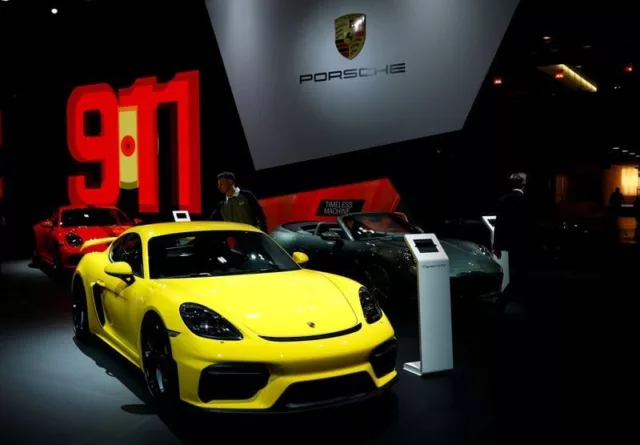
Foreign automakers are facing an uphill challenge at this year’s Shanghai Auto Show: winning back Chinese consumers as their domestic rivals roll out sleek, affordable, and technologically advanced electric vehicles at a breakneck pace.
The biggest names in the global automotive industry have seen their market share erode in recent years as sales of Chinese brands have exploded. The decline in the value of historic brands, once guarantors of prestige, is now spreading to the high-end segments, where even luxury manufacturers are struggling to compete with more efficient EV technologies and interiors packed with the latest features.
Germany’s Porsche, one of the global symbols of luxury cars for decades, has become the emblematic example of this decline. Its sales in China plunged 42% in Q1, compounding losses that began after its record annual sales of 95,671 in 2021, nearly a third of its global total that year.
Unlike other Volkswagen Group brands, such as VW and Audi, which unveiled five new electric models in Shanghai, Porsche has focused on its combustion engine heritage. The manufacturer unveiled two limited editions of its legendary 911, surrounded by vintage models. A neon sign proclaimed: «There is no substitute».
But Chinese customers are no longer buying. They are turning to futuristic local alternatives, such as BYD’s luxury models under its Yangwang brand, or those from electronics giant Xiaomi, which entered the automotive sector just last year. Xiaomi’s first model, the SU7 electric sedan, caused a sensation with its Porsche-inspired design and significantly lower price.
In February, Xiaomi launched an ultra-powerful 1,548-horsepower version called the SU7 Ultra, starting at 529,900 yuan (about $72,600). The result: 10,000 pre-orders in two hours, slightly more than Porsche’s total sales in China for the quarter. By comparison, the cheapest 911 costs 1.468 million yuan ($201,170) and offers 394 horsepower.
«Porsche is finished in China,» says Tu Le, founder of the consulting firm Sino Auto Insights. The German brand is not the only one to be losing ground to Chinese manufacturers, which are often still operating at a loss but are particularly aggressive in the market. «Foreign manufacturers understand the problem,» says Yu Zhang, managing director of Automotive Foresight in Shanghai. «But they are not reacting quickly enough.»
In September 2022, investor confidence in the Porsche brand was still so high that its market value briefly exceeded that of its imposing owner, Volkswagen. Today, Porsche’s share price has fallen 44% since its IPO and 21% since the beginning of the year. The brand’s Chinese sales are down for the third consecutive year.
Oliver Blume, CEO of Volkswagen and Porsche, tried to downplay the significance of the decline at a press conference during the presentation of the new VW and Audi models in Shanghai.
«Volume is not important to us,» he said, adding that the goal remains to maintain high prices at a level «appropriate for Porsche.» He denied any direct competition with brands such as Xiaomi or Yangwang, which he considers «cool» but inferior to Porsche in terms of «driving pleasure» and positioned in a «lower price segment.»
Blume did not rule out a complete withdrawal from the electric segment in China, where more than half of new registrations are electric or hybrid vehicles. Porsche currently sells two electric models there: the Taycan and the Macan. Without providing specific figures for each model, Blume admitted that the brand’s EV sales were «relatively low.»
«We will see in two to three years whether Porsche can exist here as an electric brand,» he added. Porsche’s iconic attributes, such as the characteristic roar of the 911’s flat-six engine, no longer appeal to the younger Chinese generation. «The prestige associated with Porsche no longer means anything to young Chinese people,» explains Bo Yu, China director at JATO Dynamics.
Change of scale
In contrast, high-end Chinese manufacturers are clearly focusing on volume. Xiaomi sold 137,000 SU7s last year, more than double the 57,000 units sold by Porsche in China for the whole year. The brand is now aiming for 350,000 sales by 2025.
Premium manufacturer Nio saw its sales climb 38.7% in 2024, reaching 221,970 units. Its CEO, William Li, speaks of a «harvest year» and expects volume to double with the launch of nine new or updated electric models.
This rapid growth in the Chinese market has resulted in falling sales for foreign manufacturers across all segments. «They will never regain their market share,» says Andrew Fellows, global automotive director at Star.
A few manufacturers are still trying to resist. Nissan, which is in financial difficulty, announced in Shanghai a new investment of $1.4 billion and the launch of ten new models to reverse the trend. «Chinese brands have been too fast, to be honest,» admits Stephen Ma, Nissan’s China director. «But today, we have reset our strategy.»
Last bastions
General Motors, which spent $5 billion on provisions for its Chinese operations in December, is also attempting a comeback by focusing on its premium Cadillac brand, which exhibited four 100% electric models in Shanghai.
One of the few bright spots for GM remains Buick’s GL8 minivan, the leader in China’s MPV (multi-purpose vehicle) segment, popular with both families and executives for chauffeur-driven trips.
Buick unveiled a GL8 concept available exclusively in electric or hybrid versions, featuring innovative in-car technologies such as reclining massage seats and a fragrance diffusion system. The stakes are high against local competitors, including BYD’s Denza, Li Auto and Xpeng, the latter having unveiled a new version of its X9 with a built-in refrigerator.
For its part, Geely subsidiary Zeekr has launched the 009 Grand: a four-seater MPV with a 43-inch TV, 24-karat gold logos and a refrigerator, because, according to a spokesperson, «the Chinese love gold.» «We’re under attack from all sides,» warns Matt Noone, design director at Buick. «We have to preserve the GL8’s supremacy before it slips away from us. And it’s a race against time».







